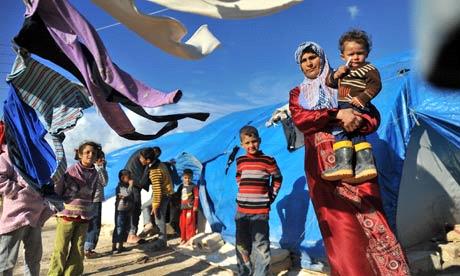Ammon News - * Clinic aims to counsel hundreds of Syrians with psychological disorders caused by fleeing homes or living in camps
By Liz Ford/ The Guardian
AMMAN - Up to 20 refugees walk into the Centre for Victims of Torture in Amman, Jordan, each day. Most are new arrivals from Syria, seeking help to deal with the trauma they have experienced.
When they arrive, they are assessed for how much support they require – the centre offers group and individual counselling, and cares for children as young as four. Their names are then put on a waiting list, although those who turn up at the centre unable to care for themselves or their families are treated immediately.
The CVT team in Amman is small and the demand is high. The organisation has 700 people on its waiting list, and expects about 1,000 to join one of its three 10-week cycles of group counselling over the next 12 months.
"Many people are struggling with some extremely difficult issues," says Adrienne Carter, a psychotherapist at the centre.
CVT is one of the many international NGOs, UN agencies and local organisations providing mental health support to refugees of the Syrian crisis, a growing recognition of the significant impact a war or natural disaster can have on people's mental health and psychosocial (psychological and social environment) wellbeing.
According to the World Health Organisation (WHO), the number of mental disorders can double after a disaster. The agency estimates that between 15% to 20% of adults caught up in an emergency will experience a mild or moderate form of depression or anxiety in the following 12 months, compared with 10% in the preceding months. Around 3% to 4% will experience more severe symptoms, such as psychosis or severe depression as a result of a crisis. There can be a range of triggers, from the sudden jolt of having to flee your home or witnessing violence, to the absence of a daily routine when in a camp, or not having your usual community support networks.
Providing mental health services to refugees is life-saving, says Melanie Megevand, the International Rescue Committee's (IRC) women's protection and empowerment co-ordinator in Jordan. She argues that these services should be treated as a basic need – as important as toilets and tents – from the onset of a crisis.
While tangible items are important, they do little to help repair the "social fabric" that has been torn apart. "What support from the IRC and other organisations can provide is full healing, so they can rebuild and take back ownership of their lives. If someone is a victim of violence, the capacity to make decisions and own your life is taken away from you," says Megevand.
Inka Weissbecker, global mental health and psychosocial adviser for the International Medical Corps, which provides relief to people affected by conflict and crisis, believes the mental health of refugees should be assessed on arrival at a camp, along with their physical needs. But she admits the suddenness of an emergency and an influx of refugees can make an immediate response difficult. "Not all countries have experience of [dealing with] a massive influx of refugees," says Weissbecker. "Jordan, for example, did not have experience of putting up huge refugee camps. There is often a lack of time and resources to plan and really think things through, especially at the beginning of a crisis."
On top of that, thousands of refugees pouring across the borders do not settle in camps. In Jordan, around two-thirds of the refugee population reside in cities and towns. Getting information about services to these people is challenging. Last month, UN Women reported that 83% of Syrian refugees in Jordan living outside camps were unaware of the services on offer for victims of gender-based violence.
Often, refugees rely on word of mouth to hear about services. In camps, some organisations simply walk around telling people about the services they provide.
However, in some respects Syrian refugees get more attention than other people who have been displaced, says Weissbecker. The crisis is high on the international agenda, which means funding and resources for mental health – albeit not enough to meet demand – are available.
Among the services offered are support groups, individual and group counselling, spaces for women to get together to discuss issues affecting them and take part in activities and skills training, and child- and youth-friendly spaces that offer activities including music, drama and sport.
Part of the support package includes preparing people for the future – whether that means returning home or resettling permanently elsewhere.
Some organisations will link refugees to their partner organisations and programmes in other countries to ensure continuity of care, and distribute information about what refugees' entitlements if they decide to relocate.
At the CVT centre, people often arrive with no thoughts of the future. But, says Carter, by the time they finish their therapy, things have usually changed. "Syrian refugees are very resilient. They have gone through so much ... but they've managed to survive, which is in itself a great thing," she says. "They often come out [of therapy] almost different people, who feel they can manage, and look to the future."
